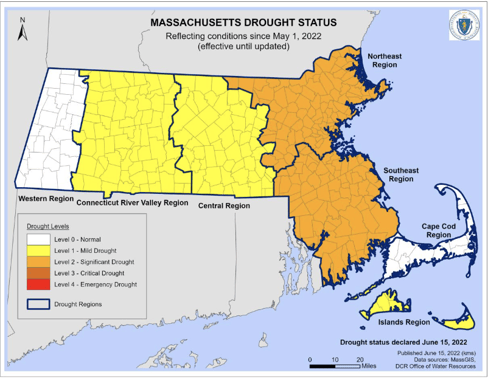If no one has told you yet, Massachusetts is currently in a drought. When people think of a drought, they think of deserts, or of people thirsting for water, but it is really a lot simpler. According to the National Drought Mitigation Center (NDMC), a drought can be defined as “a protracted period of deficient precipitation resulting in extensive damage to crops, and a consequential loss of yield,” but the same way hurricanes have different levels, droughts do as well. A drought can very much be a dry desert with no crop in sight, but it can also be the reason why your grass is turning slightly brown, or your berries and your vegetables are not blooming as frequently as they should.
 The majority of Massachusetts is in either a level 1 or level 2 drought. What does this mean? Although this is not level 3 or 4, it is still an important stage in the drought status. These are the two levels where MOST precautionary measures should be taken. According to the 2019 Drought Plan, a level 1 drought indicates that there is a mild drought, meaning that no forceful conservation measures need to be taken but rather, education and planning is communicated to the affected areas. Households in that area are limited to non-essential water use one day out of the entire week. A level 2 drought has slightly more significant measures. This means that the area is becoming significantly drier and although water conservation education is emphasized, more strict regulations are put on water service providers. On top of that non-essential use of water becomes restricted to solely hand-held hoses or watering cans, and can only be done after 5PM or before 9AM to avoid evaporative losses. If these steps, at both level 1 or 2, are taken, the consequences of the drought may not be so severe. If we continue to have no rainfall, by conserving our water now, we are helping ourselves out later on.
The majority of Massachusetts is in either a level 1 or level 2 drought. What does this mean? Although this is not level 3 or 4, it is still an important stage in the drought status. These are the two levels where MOST precautionary measures should be taken. According to the 2019 Drought Plan, a level 1 drought indicates that there is a mild drought, meaning that no forceful conservation measures need to be taken but rather, education and planning is communicated to the affected areas. Households in that area are limited to non-essential water use one day out of the entire week. A level 2 drought has slightly more significant measures. This means that the area is becoming significantly drier and although water conservation education is emphasized, more strict regulations are put on water service providers. On top of that non-essential use of water becomes restricted to solely hand-held hoses or watering cans, and can only be done after 5PM or before 9AM to avoid evaporative losses. If these steps, at both level 1 or 2, are taken, the consequences of the drought may not be so severe. If we continue to have no rainfall, by conserving our water now, we are helping ourselves out later on.
WHAT DO I DO IN A DROUGHT?
It can be a little hard to know what to expect or what to even do when a drought is coming your way. Yes we have government officials and scientists warning us about the drought and its consequences and placing restrictions in an effort to conserve water, but how do you take it to the next level?
- Address all leaks as soon as possible
- Leaks can waste a lot of water when it accumulates. One drop per second can waste 2,083 gallons of water in a year. - Minimize the size of where the lawns are watered
- If the drought is severe, then watering smaller areas of lawn can help conserve more water for essential uses. - Harvest rainwater for outdoor watering
- At Pure Solutions, we actually recycle our own rainwater! Use a system that separates the gunk from the gutter and the rainwater so you can use that rainwater for other purposes like watering your lawn and plants. - Avoid letting the water run while you brush your teeth, do the dishes, wash your face, etc.
- When water is running while you brush your teeth you can waste at least 4 gallons of water. In a four person household that brushes their teeth twice a day, thats 32 gallons of water down the drain (literally). - Never pour water down the drain if there is another use for it
- Similar to rainwater that becomes runoff and goes down the storm drains, water coming out of faucets can also be recycled instead of going down the drain. You can always use it for something else! - Avoid leaving sprinklers and hoses unattended
- Leaving sprinklers or hoses unattended can mean losing up to 600 gallons in as little as a few hours - Water your lawn in short sessions rather than one long session
- Similar to number 6, watering your lawn/plants in short quick sessions allows the water to be absorbed by the soil rather than becoming run-off - Be mindful when doing your dishes
- If you have a full load, throw those dishes in the dishwasher! Hand washing dishes can waste up to 27 gallons of water compared to 3 gallons in an energy star rated dishwasher. - Reduce use of sink disposals
- Many sink disposals require a steady stream of water to operate properly. Instead of throwing your food down the drain, throw it out or start a compost! - Try planting native/drought tolerant plants
- Having plants that are drought tolerant means they'll be able to survive with significantly less water.

